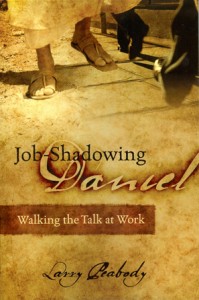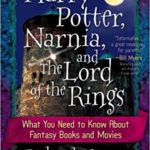Imagination: For God’s Glory and Others’ Good, Part 4
It is returning — there on a Christian radio program, here on a blog, and always in archives from when the issue was more hot (and even less thought-out): the Harry Potter debate.
Should Christians read a fantasy series that doesn’t include God or an equivalent character? Should we bother with stories about wizardry and magic? Yes, it’s only a story, some may say, but what about all those people who use those stories to get into bad stuff?
In this fourth installment of the Imagination … series, I’m not trying to prove all that is fine and can be glorifying to God. One does not even need to. Instead we find, directly in Scripture, that one can glorify God and even be gifted by Him to study and master even actual pagan beliefs, far worse than those found in a Harry Potter novel.
Thus, one needn’t show that Scripture allows reading Harry Potter, when Scripture supports a greater extreme: reading atheist Pullman’s His Dark Materials, or actual pagan religious instruction could honor God, if that’s your calling. If it’s not, the worst sin you could do is waste your time. But if you’re a reader of Christ-honoring speculative stories, much more so if you’re a writer of the same, studying pagan literature very likely is your calling.

"Job-Shadowing Daniel" by Larry Peabody is an excellent overview of the life of Daniel and Christian vocation today.
Last week’s featured Biblical imaginers were Israelite artisans Bezalel and Oholiab, the former of whom was said to be filled with God’s Spirit (Exodus 31:3) for the task of helping design a Tabernacle for the worship of God. This week we find another hero, a visionary who was also aided by God’s Spirit — the bureaucrat/prophet/seer/scholar, Daniel.
But before Daniel served his Lord by standing up to paganism in practice and anti-God laws (the accounts that prove more popular with Christians), we find out in Daniel 1 how he got there. And it wasn’t by acting as if any exposure even to real pagan stories could harm him.
Daniel: scholar of pagan stories
Setting — Daniel has been dragged to Babylon, after God had constantly warned Israel that Babylon would invade. God also said what He wanted his people to do, in Jeremiah 29.
That chapter is often quoted only for verse 11 (“For I know the plans I have …”). But when we focus only on that verse, we miss the rest of this passage, in which God speaks to His people and gives instruction for how they must interact with the pagan society that invaded them.
Build houses and live in them; plant gardens and eat their produce. Take wives and have sons and daughters; take wives for your sons, and give your daughters in marriage, that they may bear sons and daughters; multiply there, and do not decrease. But seek the welfare of the city where I have sent you into exile, and pray to the Lord on its behalf, for in its welfare you will find your welfare.
— Jeremiah 29: 5-7
This passage is being bandied about much more because of the city-evangelism emphasis of pastors like Tim Keller (see this, for example). And Daniel must have known this instruction, before he was taken far from his home, from his family, his own first name, his Temple — but not from his God. Note his clear resolution not to let Babylonian paganism get to him:
Daniel resolved that he would not defile himself with the king’s food, or with the wine that he drank. Therefore he asked the chief of the eunuchs to allow him not to defile himself. And God gave Daniel favor and compassion in the sight of the chief of the eunuchs […]
— Daniel 1: 8-9

Maybe Daniel came to class through a giant door like this, only instead with a giant "N."
Before moving on, this truth is vital. Daniel was convinced: even here, after they had changed his name and drafted him into Professor Nebuchadnezzar’s School for Gifted Youngsters, he would not be defiled. Christians should participate in a pagan culture only if they also have such a desire.
I must skip the diet-suggestion part (though with a brief reminder that this has nothing to do with “Biblical” weight loss). But notice what Daniel doesn’t vow to avoid for God’s glory?
As for these four youths, God gave them learning and skill in all literature and wisdom, and Daniel had understanding in all visions and dreams. At the end of the time, when the king had commanded that they should be brought in, the chief of the eunuchs brought them in before Nebuchadnezzar. […] And in every matter of wisdom and understanding about which the king inquired of them, he found them ten times better than all the magicians and enchanters that were in all his kingdom.
— Daniel 1: 17-20 (emphases added)
Daniel and his friends outclassed “magicians and enchanters.” And with “learning and skill in all literature and wisdom,” given to them by God.
This was Hogwarts, Babylon Satellite Campus.
This made me wonder: what in the world were they learning anyway? And so far I haven’t been able to find a complete class syllabus. However, I’m sure Daniel would not have been actively practicing occult techniques right along with “magicians and enchanters” — who we find in later chapters suffered quite the low performance reviews anyway. But would he not have at least known their notions, hypothetically? Enough to at least repeat the answers?
Even if we assume Daniel ignored even learning about actual pagan “magic” techniques on paper, it’s clear he was not only casually familiar with Babylonian literature, but mastered the subject “ten times better” than others. What kind of literature did God help him master?
As Tiamat opened her mouth to its full extent,
[Marduk] drove in the evil wind, while as yet she had not shut her lips.
The terrible winds filled her belly,
And her courage was taken from her, and her mouth she opened wide.
He seized the spear and burst her belly,
He severed her inward parts, he pierced her heart.
He overcame her and cut off her life;
He cast down her body and stood upon it.— from the Enûma Eliš, a Babylonian creation myth (it dates to at least 1100 B.C., long before Daniel’s time)
After that, Marduk rips the evil ocean goddess’s carcass in half, all the better to create the earth and skies to get the universe kick-started. Pleasant stuff. The full version could make J.K. Rowling look like Janette Oke. And yet God blessed Daniel’s learning of such literature.
I haven’t even gotten into how this myth was likely a ripoff of the Biblical creation account — a reply to the objection that we must avoid stories that mix Christianity and pagan elements!
At the very least, this proves a Christian may honor God to study what the bad guys believe. We don’t even need to mention stories written by Christians yet. Again, this is explicit Biblical support for a “worst-case scenario”: studying overtly pagan stories.
Yet doesn’t it also follow that Daniel could, for God’s glory, enjoy even the creativity of the literature he studied? Was it all right for him to learn about these false gods and myths, so long as he didn’t take any kind of pleasure in how well the stories were told or the culture was formed? Or could he appreciate the myth-tellers’ and even occult teachers’ craft, while rejecting their substance as being intended to oppose the God Whom he loved more?
Surely Daniel and his friends could do this, not only without sin, but with God’s blessing and gifting (Daniel 1:17). This was part of his unique calling to seek the welfare of his pagan city. And without his obedience to God, it seems clear that God’s plan to bring His people back to their land, and even do amazing things like save a pagan king along the way, could not have happened. How much more permissible, then, is it for Christians themselves to enjoy something far more positive than studying actual pagan stories to know what pagans believe: using their own imaginations to enjoy or even write new stories for God’s glory!
With that, I think I’m out of room again. I’m saving what I hope is the final part for next week, about Christ Himself, the ultimate Storyteller, and whether His stories were fictitious or historical — and either way, whether He meant them only to tell Moral Lessons.
Your thoughts on Daniel, pagan stories, and how God works in our gifts and imaginations?












































If the “Harry Potter debate” is returning, then I’m glad I don’t listen to much Christian radio. Recently I’ve been listening to all the HP audiobooks … I’m midway through Order of the Phoenix at the moment.
Great post! Looking forward to the next,
G
Gray, one radio host whom I greatly respect, and who is very anti-legalistic when it comes to every other issue like this, nonetheless falters on the Potter issue. Only recently, it seems, did he learn that the series does contain some Christian-inspired elements (which isn’t a plus or a minus, anyway; lots of things “salvage” Christianity because it’s the best good-versus-evil “story”). But to him that actually made the problem worse, because of the blend of Biblical themes and pagan stuff.
… E.g., a blend like the Babylonian ripoff creation myths that Daniel learned.
Next month should bring another article or two about the ongoing objections to secular fantasy stories like Harry Potter, and how Scripture itself implicitly refutes these with commands and examples of how believers with certain callings, including Daniel, engaged with the world.
Definitely food for thought…
I didn’t really like HP, so I don’t care one way or the other.
I haven’t actually read the books. Seen all but the first movie and the Part 2 (which I’ll see eventually). I’m debating.
Either way, I’m just sick of American Christians missing the point. But hey, that’s me, and it’s an entirely different post. But, really, if we had real problems over here we’d find better things to do than boycott Disney and freak out over vampires and wizard academies.
Okay, rant over. Sorry for subjecting you to that.
In response, I suggest the foundational disagreements behind the Potter debate affect other areas of life, also, and even how Christians see the nature of their struggle against sin.
Galadriel, I don’t think the issue is Harry Potter per se, but books that do the kind of thing the Potter books did — chiefly, utilized “occult” elements in its exploration of good versus evil.
I continue to say that pretend occult elements are not the same thing as actual occult elements, and Christians don’t show well to the world by not knowing the difference.
Becky
[…] Daniel, whom God gifted to stay holy and yet also be a light for Him in an abjectly pagan society, even as Daniel studied actual pagan-religion materials. All of these honored God in creativity and vocation, in both “church” and “worldly” […]
[…] (For more, see the Imagination: for God’s glory and others’ good series, especially part 4.) […]